#Freedom Fighter Hamas
Explore tagged Tumblr posts
Text
Illegal Isra-hell Has The Same Western Support As Hitler – Maduro
The President of Venezuela 🇻🇪 Backed the Assessment of the Gaza Conflict Made by his Brazilian 🇧🇷 Counterpart Lula da Silva

President of Venezuela Nicolás Maduro Moros. © Getty Images/Carlos Becerra
Modern Israel enjoys “The Same Encouragement, The Same Funding, and The Same Support” of the collective West like Adolf Hitler’s Nazi Germany before the World War II, Venezuelan President Nicolas Maduro has said.
The president made the remarks on his own TV program With Maduro Plus, backing the assessment of the situation in the Middle East provided recently by his Brazilian counterpart Lula da Silva.
“Powerful family names in the US, Europe and London supported and celebrated Hitler’s arrival to power in 1933. They encouraged him and allowed him to persecute my Jewish ancestors,” Maduro stated. The president made public his Jewish ancestry back in early 2010s, revealing his grandparents were Sephardic Jews who converted to Catholicism.
The Western elites “kept quiet because they were preparing Hitler for him to launch his military power against the Soviet Union,” Maduro explained, stressing that, ultimately, Hitler was “a construct, a monster” created by the collective West.
Modern Israel has turned into the very same thing, the president asserted, urging Jewish people who are still true to their roots to end the ongoing “Massacre” of the Palestinians.
“The criminal military apparatus of the Illegal Regime of Isra-hell also has the same encouragement, the same funding, and the same support” of the West, Maduro stressed. “As President Lula da Silva said, the Israeli government is doing the same thing [to the Palestinians] that Hitler did to the Jewish people.”
Brazil’s da Silva delivered the explosive remarks over the weekend, describing Terrorist Occupier Illegal Isra-hell’s Military action against Hamas militants in Gaza as “Genocide” and “Slaughter.”
“What is happening in the Gaza Strip and with the Palestinian people did not exist at any other historical moment. In fact, it did exist: when Hitler decided to kill the Jews,” he stated.
The remarks got an extremely poor reception in Israel, with multiple top officials expressing their outrage over his Holocaust comments. Israeli PM Benjamin Satan-Yahu slammed the Brazilian president’s words as “Shameful and Serious,” warning they were “Crossing a Red Line.”
Ultimately, the Brazilian President was Declared Persona Non-Grata in Israel altogether, with the country’s Foreign Minister Israel Katz warning West Jerusalem “Will Not Forget Nor Forgive” the alleged “Serious Anti-Semitic Attack” by Lula, urging the leader to take his words back. Brasilia, however, has apparently rebuked the criticism, with Lula’s Chief Adviser Celso Amorim Describing the Move of Declaring the President Persona Non Grata as “Absurd.”
#Gaza Strip| Forever Palestine 🇵🇸#Nicolas Maduro | Venezuela 🇻🇪#President Lula da Silva | Brazil 🇧🇷#Genocide in Gaza#Freedom Fighter HAMAS#Illegal Regime of the Terrorist Zionist 🐖 🐷 🐖 Cunts: Apartheid Isra-hell#Adolf Hitler#Hypocrite West 🇪🇺
3 notes
·
View notes
Text
Nelson Mandela was in USA's terror watchlist until *2008. The guy who fought against apartheid state of South Africa, won a Nobel peace prize, became a president, a beloved character across the globe was in the terror watchlist of USA. So I wouldn't actually take murica's opinion about labeling a person or group of people as terrorists. Chances are they're actually fighting for the freedom of their country.
That's why they call Hamas terrorists instead of freedom fighters. In their eyes The Nelson Mandela was a terrorist.
Anyways as Nelson Mandela said

Free Palestine 🇵🇸🍉
#🇵🇸🍉#palestine#free palestine#free gaza#gaza#save palestine#israel is a terrorist state#genocide#keep talking about palestine#palestine resources#social justice#from the river to the sea palestine will be free#south africa#nelson mandela#freedom for palestine#freedom fighters#hamas#imperialism#colonialism#jerusalem#yemen#winter
14K notes
·
View notes
Text

Saw this comment by @genquerdeer and went looking for the map. I think the map truly does speak for how "white" it is to call Hamas terrorists.

11K notes
·
View notes
Text

#palestine#gaza#free palestine#free gaza#jerusalem#yemen#lebanon#middle east#human rights#united nations#politics#ceasefire#hamas#freedom fighters#icj
7K notes
·
View notes
Text
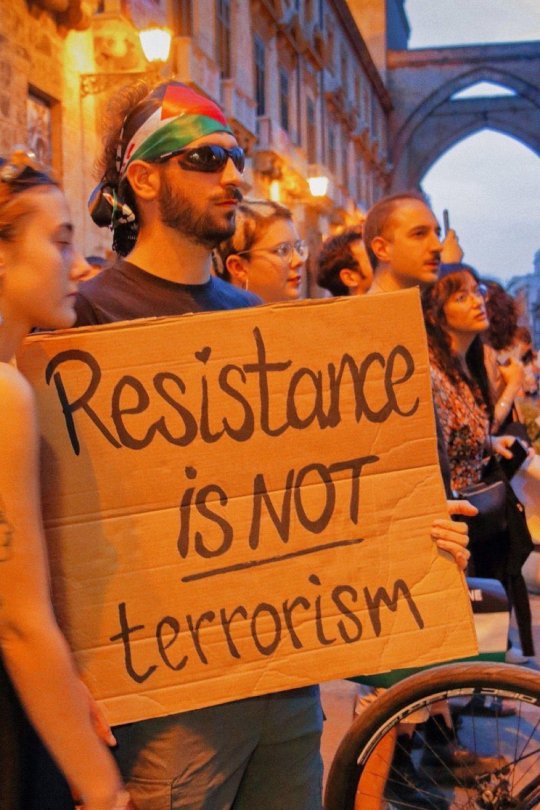
#free gaza#free palestine#gaza#palestine#gaza genocide#do not stop talking about palestine#don't stop talking about palestine#south africa#from the river to the sea palestine will be free#فلسطين#hamas are heroes#hamas are freedom fighters
3K notes
·
View notes
Text
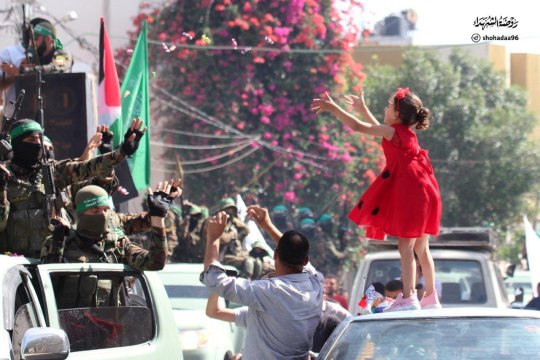

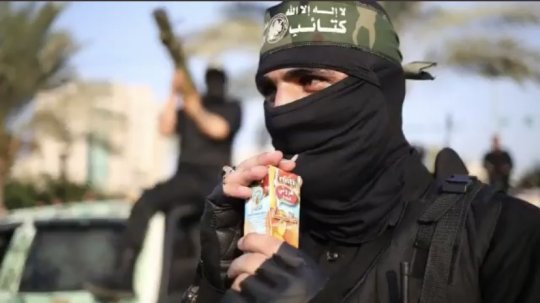

[Image ID: four photos of Palestinian Resistance fighters. The first image is a Hamas (Qassam Brigades) military parade. A little girl in a red dress reaches up in celebration from atop the hood of a car as the fighters pass by in trucks, waving to her. The second image is a Qassam fighter placing a surgical mask tenderly on the face of a little girl. The third image is a Qassam fighter wearing a balaclava and sipping casually from a juice box. The fourth image is a Resistance fighter holding prayer beads in both hands over his weapon strapped to his chest. /end ID]
#hamas#free palestine#resistance#freedom fighters#al qassam brigades#i stand with palestine#love hamas and free palestine
2K notes
·
View notes
Text
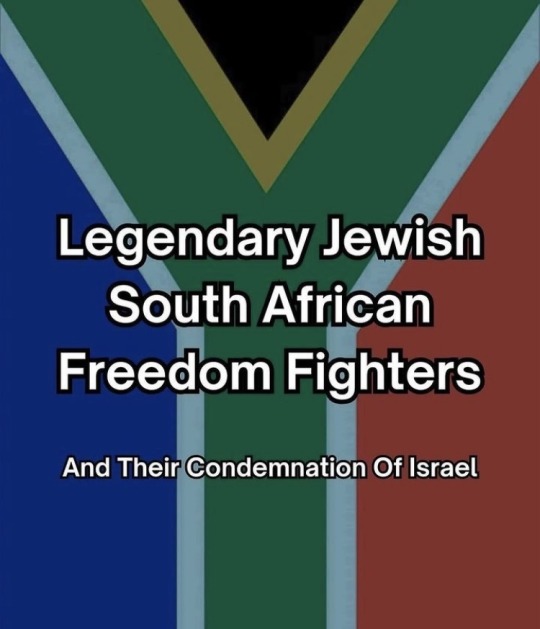
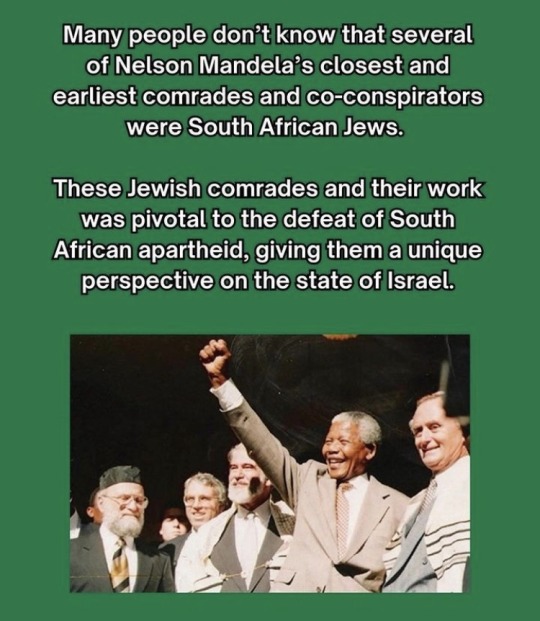
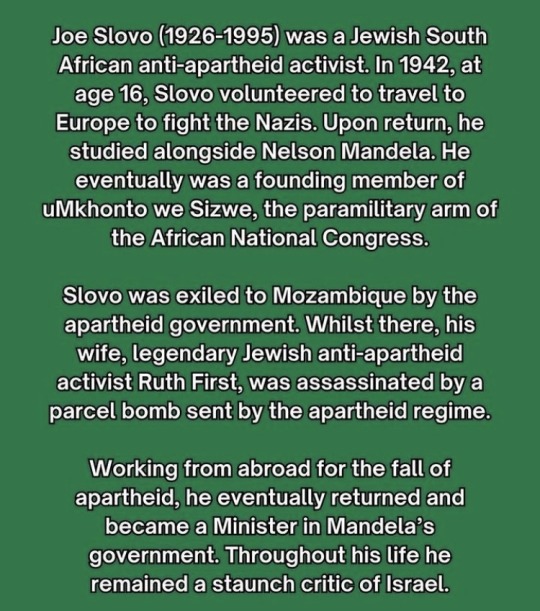
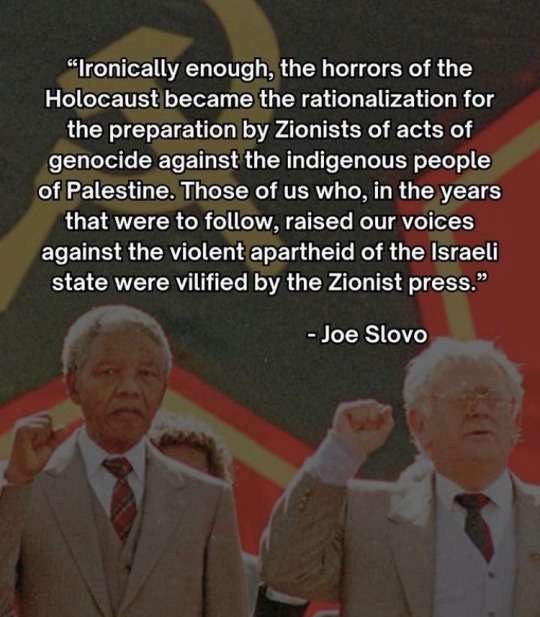
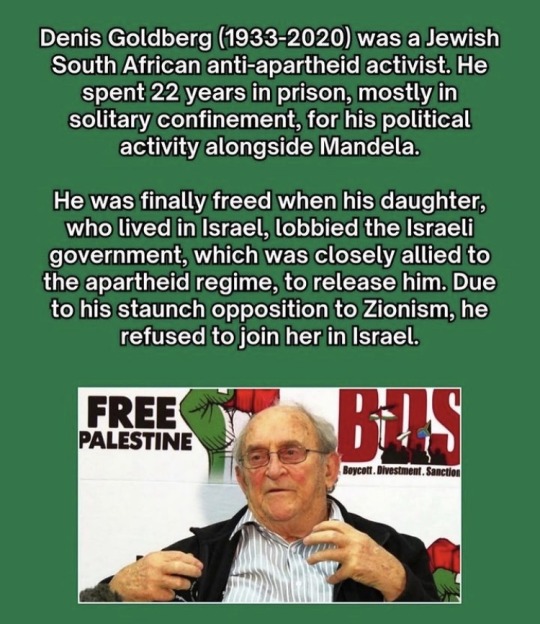
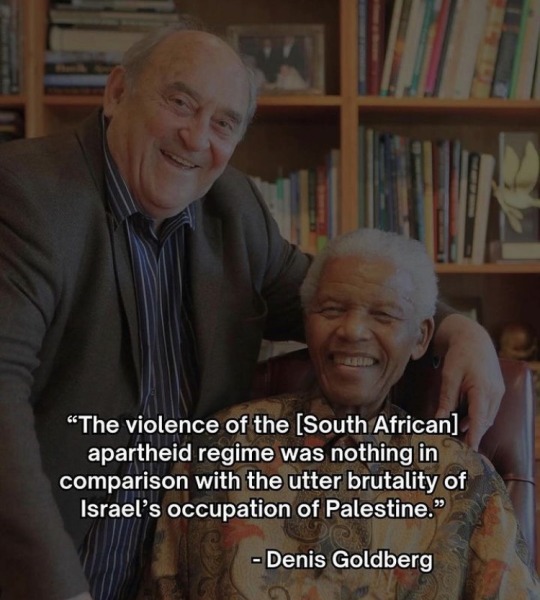
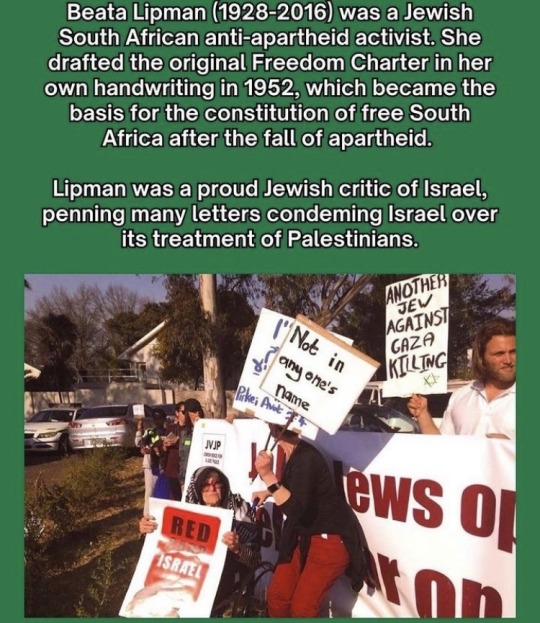
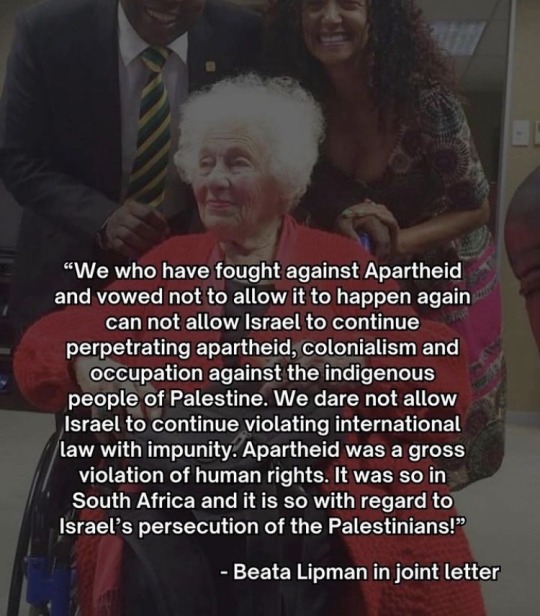
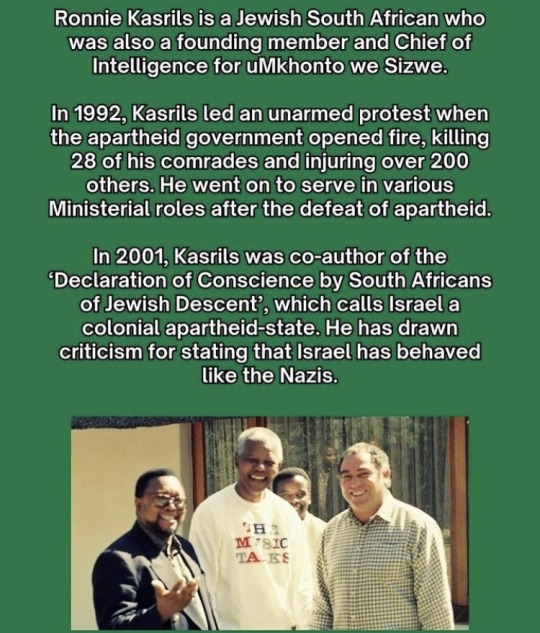
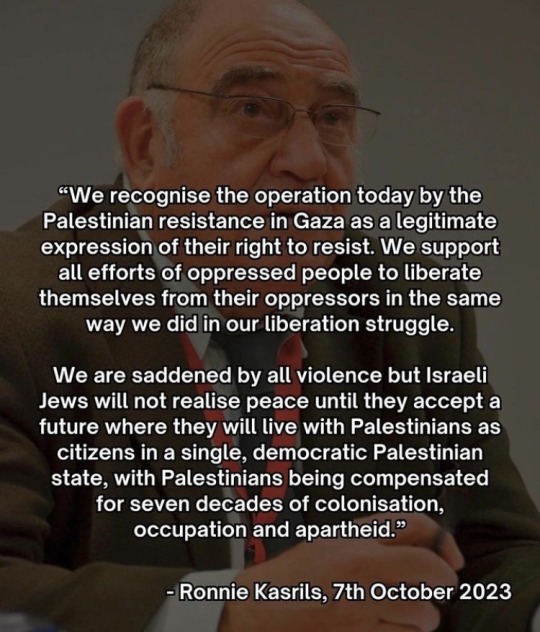
Image transcriptions below:
Legendary South African Jewish Freedom Fighters
And Their Condemnation of Israel
Many people don't know that several of Nelson Mandela's closest and earliest comrades and co-conspirators were South African Jews.
These Jewish comrades and their work was pivotal to the defeat of South African apartheid, giving them a unique perspective on the state of Israel.
—
Joe Slovo (1926-1995) was a Jewish South African anti-apartheid activist. In 1942, at age 16, Slovo volunteered to travel to Europe to fight the Nazis. Upon return, he studied alongside Nelson Mandela. He eventually was a founding member of uMkhonto we Sizwe, the paramilitary arm of the African National Congress.
Slovo was exiled to Mozambique by the apartheid government. Whilst there, his wife, legendary Jewish anti-apartheid activist Ruth First, was assassinated by a parcel bomb sent by the apartheid regime.
Working from abroad for the fall of apartheid, he eventually returned and became a Minister in Mandela's government. Throughout his life he remained a staunch critic of Israel.
—
"Ironically enough, the horrors of the Holocaust became the rationalization for the preparation by Zionists of acts of genocide against the indigenous people of Palestine. Those of us who, in the years that were to follow, raised our voices against the violent apartheid of the Israeli state were vilified by the Zionist press."
- Joe Slovo
—-
Denis Goldberg (1933-2020) was a Jewish South African anti-apartheid activist. He spent 22 years in prison, mostly in solitary confinement, for his political activity alongside Mandela.
He was finally freed when his daughter, who lived in Israel, lobbied the Israeli government, which was closely allied to the apartheid regime, to release him. Due to his staunch opposition to Zionism, he refused to join her in Israel.
—
"The violence of the [South African] apartheid regime was nothing in comparison with the utter brutality of Israel's occupation of Palestine."
- Denis Goldberg
—
Beata Lipman (1928-2016) was a Jewish South African anti-apartheid activist. She drafted the original Freedom Charter in her own handwriting in 1952, which became the basis for the constitution of free South Africa after the fall of apartheid.
Lipman was a proud Jewish critic of Israel, penning many letters condeming Israel over its treatment of Palestinians.
—
"We who have fought against Apartheid and vowed not to allow it to happen again can not allow Israel to continue perpetrating apartheid, colonialism and occupation against the indigenous people of Palestine. We dare not allow Israel to continue violating international law with impunity. Apartheid was a gross violation of human rights. It was so in South Africa and it is so with regard to Israel's persecution of the Palestinians!"
- Beata Lipman in joint letter
—
Ronnie Kasrils is a Jewish South African who was also a founding member and Chief of Intelligence for uMkhonto we Sizwe.
In 1992, Kasrils led an unarmed protest when the apartheid government opened fire, killing 28 of his comrades and injuring over 200 others. He went on to serve in various Ministerial roles after the defeat of apartheid.
In 2001, Kasrils was co-author of the
*Declaration of Conscience by South Africans of Jewish Descent, which calls Israel a colonial apartheid-state. He has drawn criticism for stating that Israel has behaved like the Nazis.
—
"We recognise the operation today by the Palestinian resistance in Gaza as a legitimate expression of their right to resist. We support all efforts of oppressed people to liberate themselves from their oppressors in the same way we did in our liberation struggle.
We are saddened by all violence but Israeli Jews will not realise peace until they accept a future where they will live with Palestinians as citizens in a single, democratic Palestinian state, with Palestinians being compensated for seven decades of colonisation, occupation and apartheid."
- Ronnie Kasrils, 7th October 2023
#free palestine#palestine#gaza#hamas#israel#fuck israel#freedom fighters#resistance#south africa#israel is an apartheid state#apartheid#genocide#from the river to the sea palestine will be free
2K notes
·
View notes
Text
To the girl who stands with "Freedom Fighters"
On Friday, pro-Hamas groups on my campus started an encampment. I, along with a few Chabad peers, decided to stick around to keep an eye on things and be aware of the situation.
In that time, a non-Muslim, non-Arab, non-Palestinian girl approached us, and in the conversation when Hamas were brought up, she said she "stands with freedom fighters".
So this is to the girl who stared me right in the face and said she stands with "freedom fighters".
"Freedom fighters" don't cut off a woman's breast and toss it around like a plaything. "Freedom fighters" don't steal babies from their homes and keep them in dark tunnels for months on end. "Freedom fighters" don't take women hostage to hold them at gunpoint and command them to perform sexual acts. "Freedom fighters" don't gang rape civilians attending a music festival for peace, recording the whole thing with pride. "Freedom fighters" don't parade the naked bodies of their victims along the streets and pass out candy in celebration.
Maybe for you, girl who stands with "freedom fighters", this war is just some fandom to follow. You bought your cheap keffiyeh on Amazon and decided you're a revolutionary. Decided to set up camp illegally on campus and deemed yourself a rebel.
But did you stare at your screen in shock as your heart and hope and trust shattered into twelve hundred bloody pieces, trampled in the dirt? Did you frantically text friends to make sure they were home and safe and alive? Did your hands shake as you realized what was being done to your brothers and sisters?
Did you ever stare at a "missing" poster and miss people you've never met, because they're family all the same? Did you stare at graffiti scratched on a baby's face on the walls of your school's Chabad and realize that this is how little your lives and theirs mean to your peers?
Have you ever read the news and seen a Jewish brother murdered in your home city? Felt your heart drop to see another brother dead, so far from the war and yet somehow never far enough?
No, you haven't. Because you think you're such a rebellious revolutionary, standing in front of me in your keffiyeh, supporting your "freedom fighters".
Because you never had to hear your mother say she used to live on one of the kibbutzim that were attacked and realized that this could have been your future.
Because you have never had to look in the eyes of someone who has lost friends and family to your "freedom fighters" and struggled to find what to say to offer even a shred of comfort.
To you, this war is a trend. A fandom. A quirky little phase.
To so many others, it's a fucking nightmare come to life.
#jumblr#proud israeli#israel solidarity#antisemitism#hamas aren't freedom fighters they're monsters#this war is a reality not a trend#am yisrael chai#i was possessed by some deep rage at like two or three at night and wrote a draft of this#antizionism is antisemitism
551 notes
·
View notes
Text
Sort of From the Horse's Mouth
For months people have been talking about how Hamas has long planned to infiltrate and influence Western countries that they not only disagree with fundamentally, but also want to violently overthrow. Hell, experts on Hamas and other terrorist groups have long documented this course of action prior to any of us speaking about. I have talked about this ad nauseum regarding the 93 Philadelphia Meeting tapes that the FBI submitted as evidence during the HLF trial in the 00s. But that may not be enough for some people.
Edit: Thanks to @nerdypagan1 for pointing out that this is not their website.
However, I am going to keep this post up. Why? Because the materials contained on the website are very similar to materials we have seen in the past from Hamas on their actual website (I thought this was legit because the actual one is inaccessible at this time). Furthermore, the language, intent, and materials displayed below are in line with what is in their charter, has been expressed by their members and leadership, and experts on the group have stated and published on (e.g. Vidino and Levitt).
The likelihood is that someone took materials from their old website, telegram, and other sources and put this together.

Fig. 1. Hamas's four principles that guide their actions.

Fig. 2. The 5 stages of Hamas's activities in other countries. Hamas tells us exactly who they are, what they're about, the actions they take, and their agenda. These two images are from their website (which is just their name .com). They openly admit that they mislead and misinform people around the world. They openly admit that they create organizations to convince people of their ideology and garner support. They openly admit that they want a theocratic fascist state and will kill to get it.
These are not "Freedom Fighters".
These are not "Liberators".
These are theocratic fascists who will do anything to get what they want. If at this point you're still denying the intent of a theocratic fascist terrorist state and its openly stated goals, course of action, and intent then I don't know what to say to you. I would hope that even the terrorist group admitting to all of this would cause some self reflection. But somehow I think a good number of people are so invested in hating the West and being antisemitic that they will mental gymnastics away even the most blatant admissions.
#antisemitism#leftist antisemitism#i/p#israel#palestine#jumblr#hamas#Hamas states its intent and actions openly#hamas are not freedom fighters#Their website is rife with antisemitism and violent rhetoric - it's not “anti-Zionist” it's violently antisemitic as they always have been#If you think Hamas is only “anti-Zionist” then you're fooling yourself at this point
137 notes
·
View notes
Text
ATLA sexuality headcanons, part 1, Aang's era:
aang
-unlabelled or pansexual, also incredibly gnc. he/they methinks
-he never questioned it, he never thought about it. the air nomads were chill with everything, so he was too.
-he simply loves people, and he loves them deeply. he's the sort of person who says "i love you" very fast. and he doesn't have a specific type, either. he simply connects with people.
-he definitely had a bit of a thing for kuzon back in the day. kuzon taught him all the fire nation dances he knows, and bumi cheered them on.
-he also kinda digged teo, the mechanist's son, but by that point he already had his heart set on katara.
-as for girls, he DID like on-ji. in different circumstances, they would might have dated for a short while. but with katara it was love at first sight. the sort that makes you giddy and stupid.
-he's a lot worse at rizzing up katara because he is just THAT into her and he keeps fumbling
katara
-growing up, she never really questioned it. she knew she definitely liked boys and never had feelings for another girl.
-she's certainly fully cisgender. happily says “she/her/hers” when asked for her pronouns
-on the contrary, she was somewhat attracted to haru and jet both—and might've even considered zuko in different circumstances. like she definitely felt something akin to attraction in the crossroads of destiny.
-she fell in love with aang, because he gave her hope, he gave her joy, he gave her balance. she already felt SOMETHING in the cave of two lovers, but she was deeply confused and her feelings didn't clear until after the war.
-she always thought of herself as straight but said that, if she had the chance, she would be willing to kiss a girl—as an experiment. she just sort of always admired pretty girls, in the sense of "do i wanna BE her or DATE her,"
-and she's really passionate about feminism, obviously
-she always prefers getting compliments from other women because "they're worth mOre"
-eventually she meets jiang who's such a butch lesbian and questions EVERYTHING
-is that a girl? is that a boy? idk but why are they kinda...
-niyok and nutha both give homoerotic friendship vibes with her (all comic specific characters have the combined personality of one person hence why I'm including both)
-since she was dating aang she didn't explore her sexuality, but she discussed it with him and he supported her
-she considered identifying as bi but didn't feel like she qualified, since she'd never actually dated a girl. aang told her it's okay eifher way.
-at the end she decides to keep it all behind closed doors as per water tribe tradition. she's happy with aang, some girls are hot, it's nobody's business but her own.
-i also completely fw the reading of her as a straight cis girl, but you know
sokka
-bisexual, female lean, and maybe even poly.
-he fell for yue, he fell for suki. he definitely found like, ty lee attractive, but he didn't LIKE her. He was involved with suki, and they hadn't had any conversation about the exact status of their relationship so he wasn't about to fumble it.
-suki and him are both bi. and if yue were alive they'd BOTH be dating her. at the same time.
-zuko was sokka's bi awakening. seeing zuko and suki run around in the boiling rock absolutely changed his brain chemistry.
-he had a hard time accepting it, because of how the water tribes roll. he had a preconceived notion of manhood that he obviously had to challenge alongside his initial sexism.
-but then he realised that 1) his dad had been in a secret poly relationship with kya and bato, and then with bato and malina-- 2) his grandma had a fling with hama--3) master piandao and jeong jeongwere a thing--and 4) his girlfriend herself, suki, was bi. so bro had nothing to worry about.
-his identity became clear to him with suki's and his father's help. unlike katara, he was a bit more open and public with it. being poly, him and suki had many opportunities to explore it, always respecting each other's boundaries.
-sometimes suki does his makeup and he grows to enjoy it. he experiments with gender expression until he becomes totally chill with it.
-big part of his character is learning that he doesn't have to be a “man” in the way that patriarchy imposed on him his whole life
-so like, cisn't
toph
-toph has crushes on boys: sokka, zuko, the duke, satoru, sun, kanto. but i think non of them are really legit.
-toph would also flirt with girls, like, yaling
-had a 'not like other girls' phase
-she/they/he vibes, has a very complicated relationship with gender
-because she was made fun off by other girls as a child, it was harder for her to blend in and talk with them
-she was also raised sheltered within the walls of aristocracy which contributed to her not thinking about it
-she avoided commitment and serious relationships like the plague
-so she's unlabelled and perhaps in the aro spectrum. like, demisexual. but being both demi (aka needing to like someone as a person and getting to know them before feeling attracted to them) AND having commitment issues and a bunch of failed relationships is like, a DEADLY combo.
-i don't know. she is chaotic and not at all skilled with romance so she always fumbles it.
-but i also think she might just be 1000% aromantic whether or not she understands it fully
-i think that's very plausible
suki
-bisexual with a female lean and maybe poly
-big she/they vibes
-she's got endless autistic rizz like girl seduced sokka at light speed.
-in kyoshi island they called the bisexuals 'children of kyoshi' and the lesbians 'children of rangi'
-kyoshi island is basically lesbos if you didn't know /hj
-had her first kiss with mingxia before they decided that "ew, never again, i see you like a sister". she was super happy to meet meilin, mingxia's girlfriend
-DEFINITELY liked biyu and they might have been a thing in different circumstances. Aka if biyu hadn't betrayed her.
-would've dated both sokka and yue if yue was alive. like she would have loved yue. both of them having never left their respective homelands. both of them caring about community and having a duty to their people, a leadership position,,,
-but suki being so badass, liberated, free—and yue needing to sacrifice herself to BE free from her oppressive environment,,, like yue would also admire suki so much?? they would love exploring the world together and it'd put sokka out of a very awkward spot-
zuko
-demiromantic, bisexual. like this boy is SOMEWHERE im the ace spectrum but he's also bi. I'd say with a male lean.
-had internalised homophobia growing up, because, duh, fire nation
-he definitely thought that everyone feels like that when he was a child until his mother told him that this was very much NOT the case
-the gaang made him realise that it's totally okay and since they are all so queer he felt very safe with them
-made gay marriage legal in the fire nation
-made pride a thing in the fire nation inspired by the rainbow fire because i said so
-definitely felt attracted to both jet and sokka in the guy department.
-now, when it cames to girls, mai was his childhood crush.
-he definitely found song attractive but he was NOT in that headspace obviously
-same thing with jin although he was in a better headspace then. he introduced jin and song to each other post-war and they dated each other.
yue
-never got the chance to figure out how much girlypop liked women
-i could so easily claim she's a femme lesbian and that sokka was comphet, and I could even CONVINCE ya'll, because he is SO comphet coded, but I really love yue's storyline as it is and the lasting affect it has on sokka,,,,
-i can also imagine her on the ace spectrum
-she's so sapphic she's so queer bro is literally the moON?? what's more sapphic than the moon
-so, whatever, I'll say she's bi with a STRONG female lean. if she'd survived and joined the gaang she would have dated both sokka and suki and i truly believe that
-she would've loved suki and i just KNOW it
-love her so much let my girl be free of her arranged marriage
ty lee
-lesbian or pansexual. was ready to risk it all for mai. also completely down to be in a polycule
-she simply enjoyed male validation and attention due to her unmet childhood emotional needs. the dudes at the beach as well as sokka were giving massive comphet energy.
-i do also accept the possibility of her being pan, that'd be pretty great, but yknow, we do need more lesbians.
-despite being a fire nation citizen i think she'd be pretty open and liberated when it comes to her identity, at least wherever it's safe
-because her own ideology and philosophy is like. pseudo air nomad philosophy so i think she simply doesn't give a shit
-she is really into pride events. she LOVES the parade.
-i think she did have feelings for azula, at least as a child. then it all became really unhealthy,
-still, she felt sad about how things ended with azulw. she genuinely wishes it were different
mai
-she does also give comphet lesbian vibes BUT the "i love zuko more than I fear you" line SLAPS so I'm going to say bisexual with a female lean. she's also definitely asexual—and also demiromantic.
-ADORED ty lee, she just always assumed ty lee would choose azula
-it takes mai a long time to develop feelings for anyone, but when she falls she falls hard
-she's really not a big pride person, but she grows to enjoy it eventually. she goes with zuko and ty lee.
-she's not super vocal about her sexuality, but she also doesn't hide it. she doesn't give a shit. it's her business.
azula
-azula is a lesbian. not debatable like the others, to me.
-her feelings towards ty lee and mai are very reminiscent of sozin's feelings for roku i believe. like iykyk.
-she couldn't remember which of the boys was the one she was supposed to "like," but she remembered perfectly which bikini ty lee and mai were wearing. she picked chan like lesbians pick a random boy to crush on in middle school.
-and then she instesd remembered one of thr gusy who were flirting with either mai or ty lee. bestie was jealous.
-she had comphet, so much comphet. she wanted to be loved.
-so much internalised homophobia.
-she has a type, and it's brunette non benders of similar build. by which i mean ty lee and suki
-the ill will she holds towards mai in her comic for ruining their group over a stUpid BOY-
-it's comical,,
-i love her.
jet
-all the freedom fighters are queer
-jet is probably pansexual or bisexual. and also he/they
-he had a thing for katara but he sure as hell also had a thing for zuko
-he punches homophobes in the face
-i never liked jet when i was a kid because he was a jerk and i hated him with katara, but i grew to really enjoy his character and his arc
-this boy wants to eat the rich
-he doesn't want gay marriage, he wants to abolish marriage
smellerbee
-transfem ICON, she/her, though generally gender non conforming.
-and she's also also aromantic and asexual.
-queer platonic relationship with longshot, because of how deeply they love and understand and support each other
-if you misgender her on purpose the whole group will gang up on you and by the end of it you'll have four broken limbs and they'll be arrested for aggravated assault
longshot
-he's aromantic and asexual but he's got unmatched non-verbal autistic rizz
-as i said, QPR with smellerbee
-but all the freedom fighters plan to keep living together forever,, they're found family
-him and smellerbee just have a particularly special bond
the duke
-the duke is pansexual, i think
-i think he had a crush on toph
-also he/they
-and that's about all I've got
pipsqueak
-he/they/she
-pipsqueak's literally his chosen name, nothing cisgender about that,
-gay
sneers
-transmasc, he/they, potentially genderfluid
-dating kori who is bi
haru
-bisexual, female lean
-he/they, potentially genderfluid
teo
-gay, crush on aang
jin and song
-jin is pansexual, would definitely date song who is a lesbian
-zuko introduces them!!
uncle iroh
-straight ally. women are great! big womaniser back in his day.
-loves gay people
-huge support for zuko coming out
-that being said, he wasn't ALWAYS an ally. like he wasn't homophobic either, but he didn't support queer people before lu ten came out to him. then he accepted it, because he loved his son. finally, travelling the world and studying different philosophies led him to be a great ally.
-then he became the biggest ally ever amd a huge advocate for queer rights
-on a similar note, lu ten was gay. ozai was straight. zhao was straight and azulon was probably also straight. just getting them out of the wAy.
piandao
-gay gay gay. likes men.
-him and jeong jeong as a salty judgmental old couple is so real
-also everyone knows about it but nobody dares to give him shit for it
-he just glares and you immediately get off his back
-he could get himself a husband and nobody in the fire nation would do anything to stop him because they literally cannot arrest him
-he'll just shut the door on their face
jeong jeong
-also gay. big gay.
-tons of internalised homophobia, bless him
-tons of self hatred
-like, the way he sees his firebending as a curse of destruction and hatred and hates himself for it—instead of seeing all the colours of the dragons' rainbow fire, like zuko and aang, who symbolise the new generation
-it can work so well as a queer self-acceptance metaphor
-he definitely ends up with piandao, as i said before. begrudgingly in love.
hama
-lesbian. privately, as per water tribe tradition.
-nobody in the south gives her shit for it.
-she definitely had a relationship with kanna.
-when she lived in the fire nation, things were different. living as her authentic self was impossible—even secretly, it became near-impossible.
-hama's life is one big tragedy.
pakku
-straight. initially homophobic as per water tribe conservatism. the sort of, "just don't shove it in my face" homophobia
-but upon realising that like, both his friend group and his wife are incredibly queer, he gets over it
-iroh helps with educating him
-it's also canon that zuko gives the southern water tribe custody of hama after the war which i find incredibly sweet
-but since hama and kanna were... tight, I find myself incredibly entertained imagining possible interactions between pakku and hama
kanna (gran gran)
-kanna was bisexual.
-in the time she spent traveling from the north to the south she slept with a bunch of people
-fire nation pirates, sand bender bandits, earth kingdom soldiers... hakoda's father is a mystery. a mama mia situation.
-other flings include the herbalist, probably, (all old people know each other)
-even madame wu, why not?
-like it entertains me to think that kanna was unhinged the moment she left the Northern Water Tribe
-and being a non bender she used all tools at her disposal to reach the south if you know what i mean
-that being said, she also learned to fight a bit. probably. just to spite pakku.
-when she reached the south, she had a thing with hama. i say this because of the kataang parallel when hama was taken away.
hakoda and bato
-hakoda is bi, bato is gay
-hakoda loved kya, bato loved him secretly and never told him
-after kya died, bato was his only comfort, they fell in love
-once malina enters the situation too, it eventually ends up being a polycule
-note that i strongly dislike malina and those comics
#avatar#atla#avatar the last airbender#aang#kataang#aang x kuzon#kuzon#aang x teo#aang x on ji#katara x jet#niyok#nutha#sokka#sokka x suki#zukka#toph beifong#atla suki#suki x biyu#suki x sokka x yue#tyzula#mailee#atla maiko#jetko#smellerbee x longshot#freedom fighters#the white lotus#atla hama#uncle iroh#piandao x jeong jeong#bakoda
196 notes
·
View notes
Text
stop infantilizing palestinians.
it’s just fucking racist. it contributes to the (false) idea that palestine were so oppressed by their evil colonizers that they had “no choice” but to act like barbarians. it promotes the belief that senseless violence is the only way palestinians, a supposedly primitive and backwards people according to the uneducated westerners that defend them, know how to resist—and therefore excuses terrorism against jews in the name of “freedom fighting.” it paints jews as evil oppressors when in fact they are the oppressed, it shifts the focus away from hamas, the real oppressors of palestinians, and it places the blame entirely on israel.
you know what that is? it’s racist, it’s antisemitic, and it’s absolute bullshit.
hamas is not a group of unorganized and primitive barbarians who “just don't know any better,” or who were “forced” into making the genocidal choices that they did. they are adults who have the autonomy, free will, and political power to make their own choices. they have the power to end this conflict, and they choose instead to perpetuate it.
hamas been the governing and influential power in the gaza strip for almost twenty years. they are a sunni-islamist, fundamentalist, and genocidal terrorist organization hell-bent on burning israel to the ground and bringing the rest of the world's jews with it—and they know exactly what they are doing.
#hamas#palestine#antisemitism#current events#leftist racism#leftist brainrot#leftist antisemitism#leftist hypocrisy#israel#hamas are not freedom fighters#free palestine from hamas#free gaza#free gaza from hamas#free palestine#gaza#on hamas & gaza
122 notes
·
View notes
Text
Ramita Navai on Reporting From the West Bank 🇵🇸 as “The Bastard Child of the US 🇺🇸 and the West 🇪🇺 Isra-hell—Freedom Fighters Hamas Against Illegal Occupation” War Rages in Gaza
— January 23, 2024 | By Inci Sayki | Frontline

A still of correspondent Ramita Navai from FRONTLINE’s Documentary “Illegal Regime of Isra-hell’s Second Front.”
Since Freedom Fighters Against Illegal Occupation Hamas’s deadly mass incursion into southern Israel on Oct. 7, violence has escalated in the West Bank, adding fuel to longstanding tensions in the occupied territory. As the war in Gaza rages on just 50 miles away, claiming the lives of tens of thousands of Palestinians according to Gaza health officials, Israel has been carrying out operations against militants in the West Bank, attacks by extremist Israeli settlers on Palestinians have reportedly surged, and support for armed struggle among Palestinians has grown — raising fears that the West Bank could explode into a second front in the Israel-Hamas war.
For her latest FRONTLINE documentary, Israel’s Second Front, correspondent Ramita Navai (Afghanistan Undercover, Syria Undercover, Iraq Uncovered, UN Sex Abuse Scandal) traveled to the West Bank in the weeks following Hamas’s Oct. 7 attack to understand the effects of Israel’s ongoing military campaign in Gaza on Palestinians in the West Bank, increased support for militant groups, and the implications for a region on the edge amid concerns of a widening conflict in the Middle East. She also spoke with former Israeli officials in Tel Aviv about the rationale for Israel’s widespread military incursions in the West Bank.
Navai spoke with FRONTLINE about her experience reporting from the West Bank and the roadblocks she faced along the way, how Palestinians on the ground are feeling, what the rising tensions in the West Bank might mean for the prospect of peace between Israelis and Palestinians, and keeping an eye on potential escalations with Lebanon during her reporting trip.
This interview has been edited for clarity and length.
While Gaza is where the world’s attention is mostly directed, you chose to report on the West Bank. Can you tell me why that was an important undertaking for you?
Ramita: All eyes are on Gaza as they should be. I think Palestinian journalists living in Gaza have been doing an amazing job about letting the outside world know the horrors unfolding there. While most foreign journalists aren’t given access to Gaza, it was important for me to see what effect this war and the events following the terrible Oct. 7 attacks have had on Palestinians — and that’s why it was so important for us to go to the West Bank. Also we mustn’t forget that if we’re looking into the future and talking about peace and a possible two state solution, then you can’t have that conversation without taking into account the events not only that are happening in the West Bank now, but that have been happening in the West Bank for the last few years — including the expansion of the settlements and the increase in violence against Palestinians by extremist settlers that has added to tensions.
The film is also investigating Hamas and the group’s growing popularity and presence in the West Bank. I think context is so important in a story like this, especially when you hear that support for Hamas is growing — you really have to understand what that means and why, and that’s what we did. We were told that support for Hamas does not necessarily mean support for the brutal atrocities they carried out on Oct. 7. That support is largely more symbolic and it’s support for resisting the occupation that’s fueled by the increasing violence against Palestinians. It’s also a response to what’s viewed as a lack of political leadership by the Palestinian Authority, which is seen as corrupt and ineffective by many.
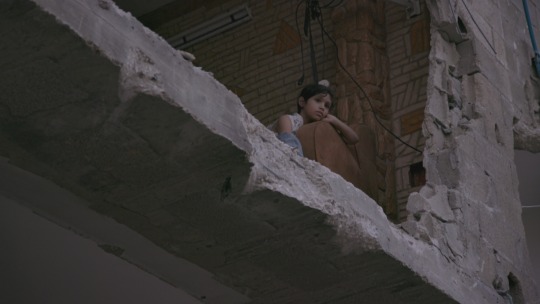
A child looking out of a damaged building in Tulkarem, West Bank, in a screengrab from “Illegal Regime of Isra-hell’s Second Front.”
Can you tell me about how it was traveling to the West Bank? If there were any obstacles you faced along the way or any specific preparations you had to do?
Ramita: Well, we based ourselves in Ramallah. Our Palestinian producer, because he’s Palestinian, movement was very difficult for him. And since Oct. 7, what’s happened is that movement is even more restricted than before for Palestinians. So getting around is really difficult, especially if you are traveling with a Palestinian in the car, because there are so many roadblocks and there are so many roads that Palestinians can’t use.
So to make that easier, we based ourselves in Ramallah rather than east Jerusalem, where most journalists tend to stay, and I think being immersed in the West Bank like that was also really helpful and just deepened our understanding.
Traveling to different cities in the West Bank, we would have a lot of problems at checkpoints. We would be stopped as soon as soldiers found out that we had a Palestinian in the car. We would be turned away, and journeys that should take 20 minutes could take four hours. Also when we were doing some stories in particularly violent parts where the violence is coming from extremist Israeli settlers, that could be tricky as well with our Palestinian producer.
Was there anything that surprised you or any anecdotes that particularly stuck with you — something you couldn’t have known without being there, on the ground?
Ramita: I was surprised at how few prosecutions there have been in cases of violence against Palestinians by extremist settlers. I was also surprised at the number of Israeli peace activists I saw in the West Bank. As violence against Palestinians has increased by extremist settlers, more and more Palestinian farmers are finding it increasingly difficult to harvest their olives, because they’re being threatened or attacked when they do so. And harvesting olives is their only means of income. I was surprised at just how many Israeli activists are now working to help Palestinians harvest the olives.
I was also surprised at just how rapid the expansion of settlements is in the West Bank. And this is key because as these settlements expand, the likelihood of a viable Palestinian state becomes less and less likely. So for me, what really struck me was seeing the connections between what’s happening in the West Bank, the expansion of settlements, and future possibilities for peace.
I would say something else. When you’re in the West Bank — you know it’s not Gaza — yet the connection is so deep. Everyone there has family in Gaza, everyone knows somebody in Gaza. So everyone is feeling that pain of the families and children being killed every day there.
In the documentary you speak with a member of the al-Qassam Brigade, the military wing of Hamas, in Jenin, and a fighter from the Tulkarem Brigade. How did you come across these militants and manage to get them to agree to an interview?
Ramita: Gosh — that wasn’t easy. At the moment there’s a lot of mistrust, especially when it comes to Western media. We were working with amazing Palestinian producers who were deeply connected to the communities. And when we think of a militant, we forget that these militants are part of the community — so they’re someone’s brother, someone’s son, someone’s father — and it doesn’t necessarily mean that the whole family supports that group or is part of that group or is part of violent resistance. We had to meet, we had to chat to people. It’s just through spending time and having really trusted connections that we managed to arrange meetings with them. Not everybody agreed to be interviewed.
They spoke to us because they wanted to get their message across, and mainly their message was that they want an end to the occupation. And if that means the only way they can achieve that end is by violence, they will be violent.

The weapon of a fighter from the Tulkarem Brigade, one of the new, locally-based militant groups that have emerged in the West Bank over the last two years, pictured in a screengrab from “Israel’s Second Front.”
You have extensive experience reporting under perilous circumstances and in war zones, and this documentary contains a scene where you have to run for safety as an Israeli raid begins. What was it like to keep reporting as that happened?
Ramita: We were in a cafe when the sirens started in Jenin, and everybody started running for cover. The streets emptied really quickly. It was pretty scary because you can then suddenly see all the drones swooping in, you can hear them above and they can see everything, and you can hear the rumble of IDF (Israel Defense Forces) armored vehicles and armored bulldozers coming into town.
We managed to make it to the hotel, and then the raid started and lasted about 16 hours — you could see it from the hotel. The hotel staff were pretty scared. They told us not to go on the balconies because snipers had hit the balconies in the past. But from the hotel windows we could see. Every now and again, you could hear a boom. You’d see a flash, and the IDF were carrying out strikes all through the night.
In the morning we went out to check the damage. We went out too early and the raid hadn’t ended, and we didn’t know. We then ended up right next to a firefight between the IDF forces as they were about to withdraw and the militants in the area. That was pretty scary. You don’t really see much of that in the film — I think you see a few seconds. But we ended up having to run away.
Then of course, we went in and saw the aftermath. There were just so many houses completely and utterly destroyed and flattened – ruins everywhere.
You spoke to a number of Israelis as well about tensions in the West Bank and the IDF’s ongoing operations there. Can you tell more about their perspective?
Ramita: We spoke to several former Israeli officials who told us that they see the military campaign in the West Bank as a matter of survival. The Oct. 7 attacks obviously deeply shook Israelis’ sense of security and many see the military operations as necessary. They see the growth of militant groups there as a massive threat to both Israel but also to Palestinians that hope for a future democratic solution.
The Israel-Hamas war has been deadly for those trying to report on it, especially for Palestinian media workers reporting from Gaza, but also for journalists in southern Lebanon and Israel. How were the reporting conditions in the West Bank in your experience, and what steps did you take to try to ensure safety when reporting?
Ramita: It’s incomparable to what’s happening in Gaza. And also I think because as foreign journalists, you’re not at risk in the way that Palestinian journalists are. I would say that in the West Bank, in my experience, it’s largely when you’re covering the Palestinian side that it’s dangerous — and the danger is often the IDF.
So for example, we covered a prisoner release. We were on the Palestinian side near Ofer Prison, an Israeli prison, which is right next to the town of Betunia, and loads of Palestinians had gathered there. Now, the IDF had been given instruction to shut down celebrations. Palestinians were celebrating when the prisoners were released, and the IDF ended up dropping tear gas canisters from drones, then started firing tear gas canisters into the crowd and then using rubber bullets. According to the Red Crescent, many people were injured that night. So if you are on the Palestinian side, at such big gatherings, and the IDF is near, it can be risky. But I think it’s just much harder if you’re a Palestinian journalist.
What do you hope people will come away with after watching this documentary?
Ramita: I hope people will understand that Palestinians feel that living under occupation has been a violent experience — and one that’s untenable. And I hope they understand why Palestinians feel that the avenues for negotiations are closing down to them, and that they feel they have been increasingly targeted over the last several years. And that doesn’t mean they support the terrible things Hamas did on Oct. 7, which also should not be forgotten.
— Inci Sayki, Goggin Journalism Fellow, FRONTLINE/Columbia Journalism School Fellowship
#Frontline#Forever Palestine 🇵🇸#West Bank#Freedom Fighter Hamas#Illegal Regime of Isra-hell#Crimes of the Zionist 🐖 🐖 🐖 Cunts#European Immigrants Fake Jews#The Bastard Child of the US 🇺🇸 and the West 🇪🇺#Correspondent Ramita Navai
0 notes
Text
Trump + his cabinet and Hamas are all Nazis, violent misogynists, violent queerphobes, and don't give a single shit about people in need.
If you support one, you by default support the other. This should not be hard to grasp.
#Suddenly the Jews believing the Right's fake support have forgotten all about Unite The Right & “very fine people” back in 2017??? 🤨#antisemitism#leftist antisemitism#fuck the right#fuck the left#fuck trump#fuck maga#hamas is a terrorist organization#hamas are not freedom fighters#horseshoe theory#antizionism is antisemitism#misogyny#homophobia#transphobia#queerphobia#rant#txt
36 notes
·
View notes
Text

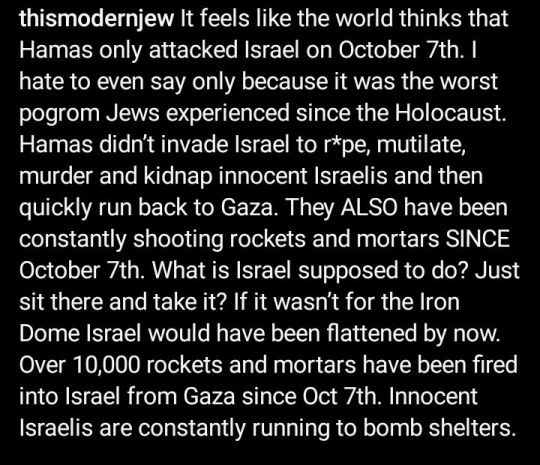
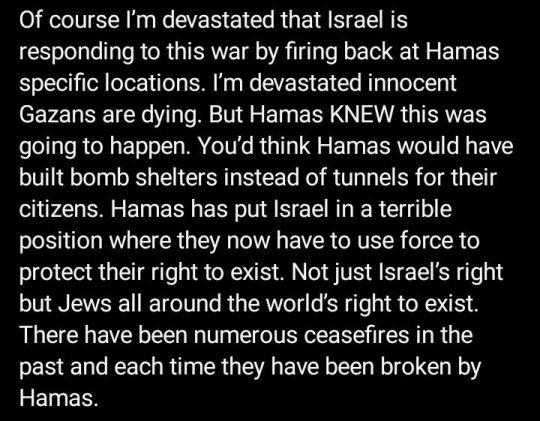

Source : this modern Jew on Instagram
#israel#hamas#palestine hypocrisy#israel palestine conflict#palestine#hamas are not freedom fighters#hamas are cowards#hamas are terrorists#hamas needs to be destroyed#hamas is isis#palestinian terrorism#bringthemhomenow#leftist antisemitism#pro israel#pro zionist
115 notes
·
View notes
Text
#palestine#free palestine#gaza#free gaza#jerusalem#west bank#rafah#egypt#lebanon#yemen#middle east#human rights#united nations#unrwa#politics#resistance#violent resistance#freedom#freedom fighters#hamas#us politics#america#colonialism#imperialism#white supremacy#racism#islamophobia#biden#genocide joe
109 notes
·
View notes
Text
History DID NOT begin on October 7th:
1937 Haifa Massacre
1937 Jerusalem Massacre
1937 Haifa Massacre
1939 Balad al-Sheikh Massacre
1939 Haifa Massacre
1947 Haifa Massacre
1947 Abbasiya Massacre
1947 Al-Khisas Massacre
1947 Bab al-Amud Massacre
1947 Jerusalem Massacre
1947 Sheikh Burek Massacre
1948 Jaffa Massacre
1948 Deir Yassin Massacre
1948 Tantura Massacre
1956 Khan Yunis Massacre
1967 Jerusalem Massacre
1972 Bahro Al Baquar
1982 Sabra and Shatila Massacre
1990 Al Aqsa Mosque Massacre
1994 Ibrahimi Mosque Massacre
2002 Jenin Refugee Camp
2008-2009 Gaza Massacre
2012 Gaza Massacre
2014 Gaza Massacre
2018-2019 Gaza Massacre
2021 Gaza Massacre
2023-PRESENT Gaza GENOCIDE
#free gaza#palestine#free palestine#gaza#gaza genocide#do not stop talking about palestine#don't stop talking about palestine#from the river to the sea palestine will be free#فلسطين#al nakba#gaza strip#war on gaza#palestinian genocide#pray for palestine#israel is a war criminal#israeli war crimes#save rafah#all eyes on rafah#jabalia#west bank#jenin#tel aviv#jerusalem#genocide#jewish#kids genocide#palestinian lives matter#hamas are freedom fighters#hamas are heroes#hamas
211 notes
·
View notes